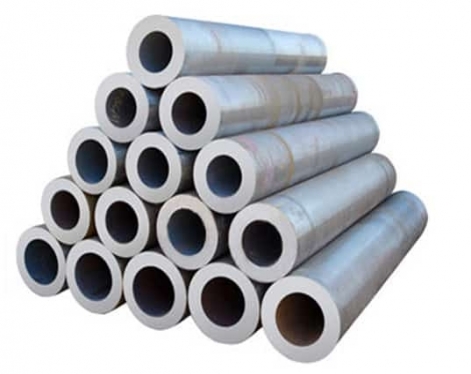The finished thick-walled seamless steel pipes are sent to the inspection department for product quality inspection after finishing, which is an important measure to ensure the quality of the thick-walled seamless steel pipes. 16Mn steel pipes are made of a single piece of metal and have no seams on the surface, which are called seamless steel pipes. According to the production method, seamless pipes are divided into hot-rolled pipes, cold-rolled pipes, cold-drawn pipes, extruded pipes, and top pipes. 20G thick-walled steel pipes can be used in pipelines, thermal equipment, machinery industry, petroleum geological exploration, containers, chemical industry and special purposes. It is a kind of seamless tube.
Seamless steel pipes are widely used in manufacturing industries such as construction, machinery, coal mines, chemicals, electric power, railway vehicles, automobile industry, highways, bridges, containers, sports facilities, agricultural machinery, petroleum machinery, and prospecting machinery. The inspection standards and website content are regulated by national standards and some standards or technical conditions.
The inspection of finished thick-walled seamless steel pipes can be random and complete. Sampling inspection is generally to determine the mechanical properties, internal organization and chemical composition of thick-walled seamless steel pipes. In addition to sampling inspection of thick-walled seamless steel pipes in a batch, some important-purpose thick-walled seamless steel pipes sometimes also need to be fully inspected. In addition, hot-rolled thick-walled seamless steel pipes are subject to process tests such as flattening, folding, crimping and flaring, as well as water pressure tests according to standard requirements. The inner and outer surface quality of thick-walled seamless steel pipes must be inspected with naked eyes or with special equipment. Of course, the simplest inspection method is manual visual inspection, but it takes up a lot of manpower and labor is heavy, it is easy to make mistakes, and it is not easy to realize mechanization and automation.
The non-destructive inspection method is labor-saving and reliable, and can realize mechanization and automation; therefore, it has been widely developed. In the past, the inspection of the geometric dimensions of thick-walled seamless steel pipes was mostly manual. In recent years, automatic measuring instruments such as thickness gauges and optical pulse diameter gauges have been widely used.
These instruments for measuring the size of thick-walled seamless steel pipes can not only be used for the inspection of finished pipes, but also can be placed on the process line for monitoring and measurement, which facilitates effective and timely control of thick-walled seamless steel pipes during the rolling process. Seam steel pipe dimensional tolerances, thereby improving the geometric accuracy of thick-walled seamless steel pipes and reducing defective products with out-of-tolerance.
Seamless steel pipes are widely used in manufacturing industries such as construction, machinery, coal mines, chemicals, electric power, railway vehicles, automobile industry, highways, bridges, containers, sports facilities, agricultural machinery, petroleum machinery, and prospecting machinery. The inspection standards and website content are regulated by national standards and some standards or technical conditions.
The inspection of finished thick-walled seamless steel pipes can be random and complete. Sampling inspection is generally to determine the mechanical properties, internal organization and chemical composition of thick-walled seamless steel pipes. In addition to sampling inspection of thick-walled seamless steel pipes in a batch, some important-purpose thick-walled seamless steel pipes sometimes also need to be fully inspected. In addition, hot-rolled thick-walled seamless steel pipes are subject to process tests such as flattening, folding, crimping and flaring, as well as water pressure tests according to standard requirements. The inner and outer surface quality of thick-walled seamless steel pipes must be inspected with naked eyes or with special equipment. Of course, the simplest inspection method is manual visual inspection, but it takes up a lot of manpower and labor is heavy, it is easy to make mistakes, and it is not easy to realize mechanization and automation.
The non-destructive inspection method is labor-saving and reliable, and can realize mechanization and automation; therefore, it has been widely developed. In the past, the inspection of the geometric dimensions of thick-walled seamless steel pipes was mostly manual. In recent years, automatic measuring instruments such as thickness gauges and optical pulse diameter gauges have been widely used.
These instruments for measuring the size of thick-walled seamless steel pipes can not only be used for the inspection of finished pipes, but also can be placed on the process line for monitoring and measurement, which facilitates effective and timely control of thick-walled seamless steel pipes during the rolling process. Seam steel pipe dimensional tolerances, thereby improving the geometric accuracy of thick-walled seamless steel pipes and reducing defective products with out-of-tolerance.









